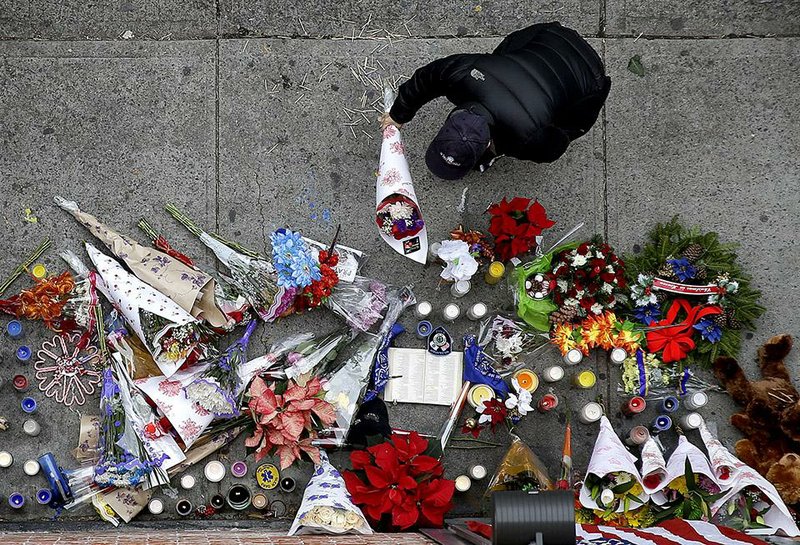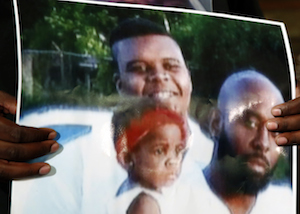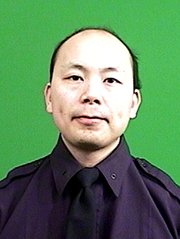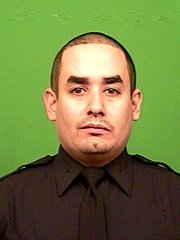NEW YORK -- Civil-rights leaders Sunday condemned the ambush killings of two New York police officers and expressed fear that the backlash over the bloodshed could derail the protest movement that has grown out of the deaths of Michael Brown and Eric Garner.
In the hours after the killing of the officers, police union officials and politicians accused those who have protested the deaths of Garner and Brown of fanning anti-police fervor. Patrick Lynch, president of the Patrolman's Benevolent Association in New York, said there was "blood on the hands" of demonstrators and elected officials who have criticized police tactics.
The Garner and Brown families issued statements repudiating the officers' killings, while civil-rights leaders took to the airwaves to try to put some distance between the movement and the crime.
"To link the criminal insanity of a lone gunman to the peaceful protests and aspirations of many people across the country, including the attorney general, the mayor and even the president, is simply not fair," NAACP President Cornell William Brooks said on CBS' Face the Nation.
Officers Rafael Ramos, 40, and Wenjian Liu, 32, were gunned down at close range in their patrol car in Brooklyn on Saturday by Ismaaiyl Brinsley, who then committed suicide. Before the attack, Brinsley, 28, wrote on an Instagram account: "I'm putting wings on pigs today. They take 1 of ours, let's take 2 of theirs."
He used the hashtags #Shootthepolice, #RIPErivGardner and #RIPMikeBrown -- references to two blacks who died at the hands of police. Garner died after a New York City officer's chokehold, and Brown was shot by an officer in Ferguson, Mo. Grand juries decided not to bring charges against either officer.
Brinsley had a long criminal record, a hatred for police and the government and an apparent history of mental instability that included an attempt to hang himself a year ago, authorities said Sunday.
Moments before opening fire, he approached people on the street and asked them to follow him on Instagram, then told them, "Watch what I'm going to do," Chief of Detectives Robert Boyce said.
Brinsley was black; the slain officers were Asian and Hispanic.
Investigators were trying to determine whether Brinsley had taken part in any protests over the deaths of Brown and Garner.
Brinsley had at least 19 arrests in Georgia and Ohio, spent two years in prison for gun possession and had a troubled childhood so violent his mother was afraid of him, police said. He ranted online about police and the government and expressed "self-despair and anger at himself and where his life was," Boyce said.
Boyce said Brinsley's mother, who lives in Brooklyn, believed he had undiagnosed mental problems and may have been on medication at some point, but detectives were still trying to determine whether he had a mental illness.
Boyce said Brinsley first walked past the patrol car, crossed the street and then approached the car from behind. He stood outside the passenger-side window and fired four shots into the vehicle, killing the officers.
Brinsley fled the scene but was followed by two Consolidated Edison workers, whom the police called heroic. They alerted the police that Brinsley had headed down onto a Brooklyn subway platform, where he was confronted by police officers and killed himself with a single bullet.
The officers never had a chance to draw their weapons and may never have seen Brinsley, New York City Police Commissioner William Bratton said. Both were taken to Woodhull Hospital, where they were pronounced dead.
Ramos was a two-year veteran of the Police Department and was married with a 13-year-old son, while Liu had been with the department seven years and was recently married.
"It's sometime difficult to find the words to speak to events like those that occurred today, to try and make sense of them. But we'll try," Bratton said.
On Saturday, Brinsley began his day with bloodshed, according to police. Before he left for New York, he entered the apartment of a former girlfriend in Maryland at about 5:30 a.m., police said.
The two argued and he shot her once.
Officials in Baltimore County identified the woman Sunday as Shaneka Nicole Thompson, 29. Authorities said Thompson was shot in the abdomen and remains in critical but stable condition.
Baltimore-area police warned the New York department Saturday that Brinsley was in the city and bent on violence. But New York police were still getting the word out when Brinsley struck.
President Barack Obama, on vacation in Hawaii, called Bratton on Sunday to offer condolences as Jeh Johnson, the head of the Department of Homeland Security, visited the Brooklyn precinct where the slain officers worked.
Obama also spoke to Philadelphia Police Commissioner Charles Ramsey, who is co-chairing a task force on 21st-century policing that Obama established in the wake of Brown's death.
The president asked Ramsey, who has been outspoken in his concern over the shooting of the two officers, to use the recently established task force to address the issue of violence against police and find ways to engage police officers across the U.S., said White House spokesman Eric Schultz.
In the wake of the ambush, former New York Mayor Rudy Giuliani lashed out at New York Mayor Bill de Blasio, Obama and Attorney General Eric Holder. Speaking on Fox News, Giuliani said: "We've had four months of propaganda starting with the president that everybody should hate the police.
"They have created an atmosphere of severe, strong, anti-police hatred in certain communities, and for that, they should be ashamed of themselves," he said.
The way Brinsley had stalked the officers set off a bunker mentality across the department.
New York City officers going out on foot patrol were directed to work only in pairs. Sentries were posted out stationhouses. The department suspended patrols by auxiliary officers -- thousands of unarmed volunteers who act as the eyes and ears of the department in many communities. Detectives were told by the head of their union to go out in teams of three.
Meanwhile, a flurry of notices by police union leaders stopped short of urging members not to respond to calls for help, but prescribed steps for putting their own safety first.
The officers' deaths heightened tension between the de Blasio administration and police unions over the mayor's comments after grand juries made no indictments in the Garner and Brown deaths and his handling of resulting street protests.
Several police officers, led by Lynch and Edward Mullins of the sergeants' union, turned their backs on de Blasio as he entered a news briefing Saturday at Woodhull Hospital.
In a tweet, former New York Gov. George Pataki called the killings the "predictable outcome of divisive, anti-cop rhetoric of Attorney General Eric Holder and Bill De Blasio."
The accusations stoked fears that any gains made in the protest movement would be lost.
"We've been denouncing violence in our community" no matter who the target is, New York community activist Tony Herbert said. He said he worries that the shooting will be used to discredit the larger cause.
Justice League NYC, an organization that had met with de Blasio on Friday, held a march as planned Sunday night. But after the killings, the route was redirected to end at First Corinthian Baptist Church in Harlem for a service of healing to remember all victims of violence -- including police officers.
The marchers met a group of police officers and about 150 mourners at a makeshift memorial, where those gathered thanked the officers for their service.
The Rev. Al Sharpton, who helped lead protests against the police in the wake of the Garner decision, held a news conference Sunday to condemn the attack on the officers.
"If we go into an area where it is an eye for an eye, then it is only a matter of who can outpluck eyes," he said.
At an appearance with Sharpton, Garner's mother expressed her dismay over the killings of the officers.
"We are going in peace, and anyone who's standing with us, we want you to not use Eric Garner's name for violence because we are not about that," Gwen Garner said.
The family of Ramos also appealed for peace in the days ahead.
Cousin Ronnie Gonzalez said the family has already forgiven the gunman. "He's in the hands of God now," he said. "We don't believe in vengeance; we just forgive."
Elsewhere, a fugitive trying to evade an arrest warrant shot a Tampa-area police officer and then ran him over early Sunday, killing the officer, police said.
Marco Antonio Parilla Jr., 23, crashed his car into a pole and another vehicle after running over Tarpon Springs officer Charles Kondek, police said. Parilla was arrested on suspicion of first-degree murder.
Kondek, 45, had been with the local force for 17 years. Originally from New York, Kondek previously served on the New York City Police Department for more than five years, authorities said.
Information for this article was contributed by Rik Stevens, Verena Dobnik, Jennifer Peltz, Mike Balsamo Tom Hays, Deepti Hajela, Josh Lederman, Michael J. Mishak and staff members of The Associated Press; by Chris Dolmetsch, Henry Goldman, Jodi Schneider and Nancy Moran of Bloomberg News; and by Marc Santora, Kim Barker, Al Baker, Liz Robbins, Nikita Stewart and J. David Goodman of The New York Times.
A Section on 12/22/2014




